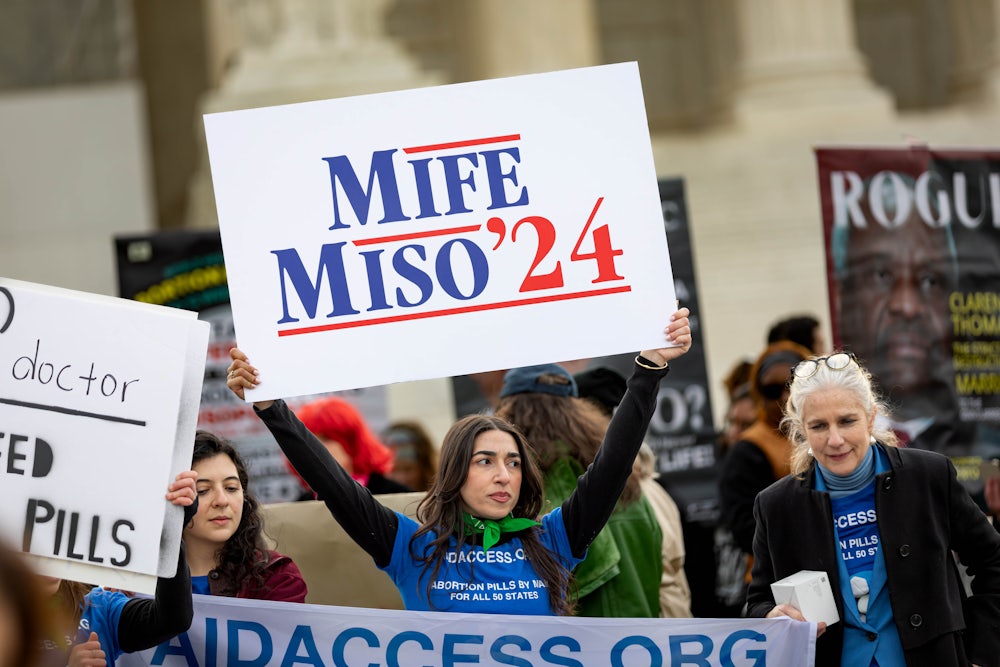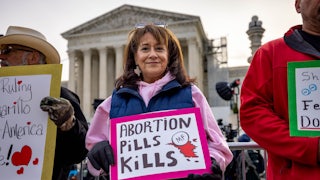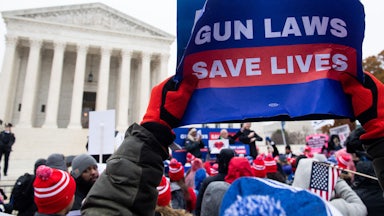When Louisiana State Senator Thomas Pressly introduced his bill to categorize two common, safe medications used for abortion as “controlled substances” two months ago, he couldn’t even name the medications. “So it’s misoprostol and, um …” began Pressly. “Mifepristone,” added his sister, Catherine Pressly Herring, who reportedly inspired the law after her (now ex-) husband dosed her with the drugs without her knowledge.
In late May, Pressly’s bill became law, making it a crime to possess the drugs he struggled to name. Scheduling misoprostol and mifepristone as controlled substances is a new move but part of a broader fixation since the Dobbs v. Jackson Women’s Health Organization ruling. Anti-abortion groups might soon try to replicate Pressly’s success in other states. They are so focused on medication abortion not because it poses some new risk to pregnant people but because it allows people to evade abortion bans.
Louisiana Right to Life confirmed to The New Republic their direct involvement in shaping the bill. “Sen. Pressly reached out to us with the tragic personal story from his sister, Catherine Herring,” Sarah Zagorski Jones, communications director for Louisiana Right to Life, wrote in a statement. “Louisiana Right to Life did work with Sen. Pressly throughout the legislative process.” (Senator Pressly did not respond to a similar inquiry before publication.) The group is an affiliate of the National Right to Life Committee, which has crafted model post-Roe anti-abortion bills that could be introduced in any state. When asked whether the bill was based on model legislation that may be introduced in other states, Zagorski Jones said that their “focus was solely on ensuring this never happens in Louisiana”—where, indeed, it has not happened, as Senator Pressly’s sister resides in Texas. “If a state is interested in learning more,” Zagorski added, “we would be open to discussing it with them.”
Senator Pressly has said his law is meant to “control the rampant illegal distribution of abortion-inducing drugs,” to further criminalize abortion when abortion is already against the law. That’s because, despite Louisiana’s near-total abortion ban, which went into effect in 2022, misoprostol and mifepristone remain available via online pharmacies, prescriptions from providers in states protected by shield laws, and other more informal avenues. Now anti-abortion lawmakers are searching for ways to expand the web of abortion criminalization from abortion providers to anyone who distributes misoprostol and mifepristone. Pressly may say the law was inspired by his former brother-in-law poisoning his sister, but the effect of the Louisiana law, much like the Texas anti-abortion law Senate Bill 8, is to target those who help people obtain abortions. By threatening informal community networks sharing pills and information, it ensures that people who are seeking an abortion are isolated from support.
“This law will create more confusion, fear, and stigma for people trying to access safe abortion and miscarriage care and for those who assist and support them,” Brittany Fonteno, president and CEO of the National Abortion Federation, said in a public statement after the law was passed. “Furthermore, a ‘controlled substance’ designation also enables states to create a database of who’s receiving the drugs, which could be particularly frightening and dangerous for people seeking abortion care.”
It is already against the law to use either mifepristone or misoprostol for an abortion in Louisiana. Anyone using them for other purposes, such as treating a miscarriage or inducing labor, was already required to have a prescription. But when Pressly’s law goes into effect on October 1, possession of an “abortion-inducing drug” without a prescription would be a crime. Those possessing such drugs without a prescription could be jailed for up to five years and fined up to $5,000. Pressly has said the law is not meant to be used to prosecute someone for taking the drugs themselves because it defines “possess[ing] mifepristone or misoprostol for her own consumption” as exempt from the law. But in practical terms, policing and surveillance will inevitably involve the pregnant person self-managing an abortion if you redefine helping them as a criminal act. There is no exempting people taking abortion pills from being questioned, searched, or detained in the course of law enforcement investigating those who allegedly got them pills.
The new law would also mean that any prescriptions for these drugs in Louisiana would be logged in the state’s database tracking controlled substances, with prescription information accessible to law enforcement (with a warrant) as well as Louisiana’s medical board. “Under this law, doctors will be tracked in a database every time they write a prescription for mifepristone or misoprostol,” said WWNO reporter Rosemary Westwood, “and pharmacists—I mean, in Louisiana, some have already been more hesitant to dispense these drugs.”
Anti-abortion groups supporting the law have used it to spread misinformation about the safety and efficacy of medication abortion, which in turn will increase fear and stigma. The anti-abortion group Louisiana Right to Life produced a “factsheet” on the bill that claims, “By letting abortion pills be sent through the mail without an in-person doctor’s appointment, they have set the stage for the dangerous abuse of these drugs.” (The same rhetoric has been used by groups that have brought a challenge to the Food and Drug Administration’s current regulation of mifepristone to the Supreme Court.) Citing the story of Pressly’s sister, the group then claims that the goal of the law, in part, is “to stop these pills from getting into the hands of predators and minors.”
This is a critical step advancing the narrative that medication abortion is dangerous, leaping from Pressly’s sister to a purported wider threat. Anti-abortion groups use the widespread availability and use of mifepristone and misoprostol to push claims that the pills are being used to abuse or exploit women and girls. Use and misuse are conflated throughout—just as Senator Pressly has done in advancing the law. “I don’t disagree with him that his sister was abused, she was the victim of a criminal act,” a maternal fetal medicine specialist in Louisiana told Jezebel. “You can slip somebody lethal doses of anything to hurt them but that doesn’t mean that a state should mark this as a controlled substance.”
The controlled substance provision crafted by Louisiana Right to Life has caught the attention of national groups already. Celebrating the passage of Pressly’s law, Susan B. Anthony Pro-Life America described the offense targeted in the law as “abortion drug poisoning.” Their president, Marjorie Dannenfelser, also added, “Leaders on both sides of the aisle must take this threat to women seriously and roll back the shield laws and mail-order of abortion drugs that enable abusers.” Life Issues Institute noted, “This is a brilliant move that hopefully other states will follow.” Perhaps less well known, the group was co-founded by John Wilke, the founder of the National Right to Life Committee, and they have played a leading role in setting the anti-abortion movement’s messaging.
Whether or not other states introduce copycat bills, the Louisiana law could help drive the next phase of anti-abortion groups’ attacks on medication abortion. That might be creating this new crime: “abortion drug poisoning.” It might also be establishing the narrative that abusive partners are somehow enabled by access to medication abortion, even in states like Texas (and Louisiana) where it is banned. However this manifests, it will be animated by the same agenda: to make us fearful about having or helping anyone have an abortion, even beyond the letter of the law.








